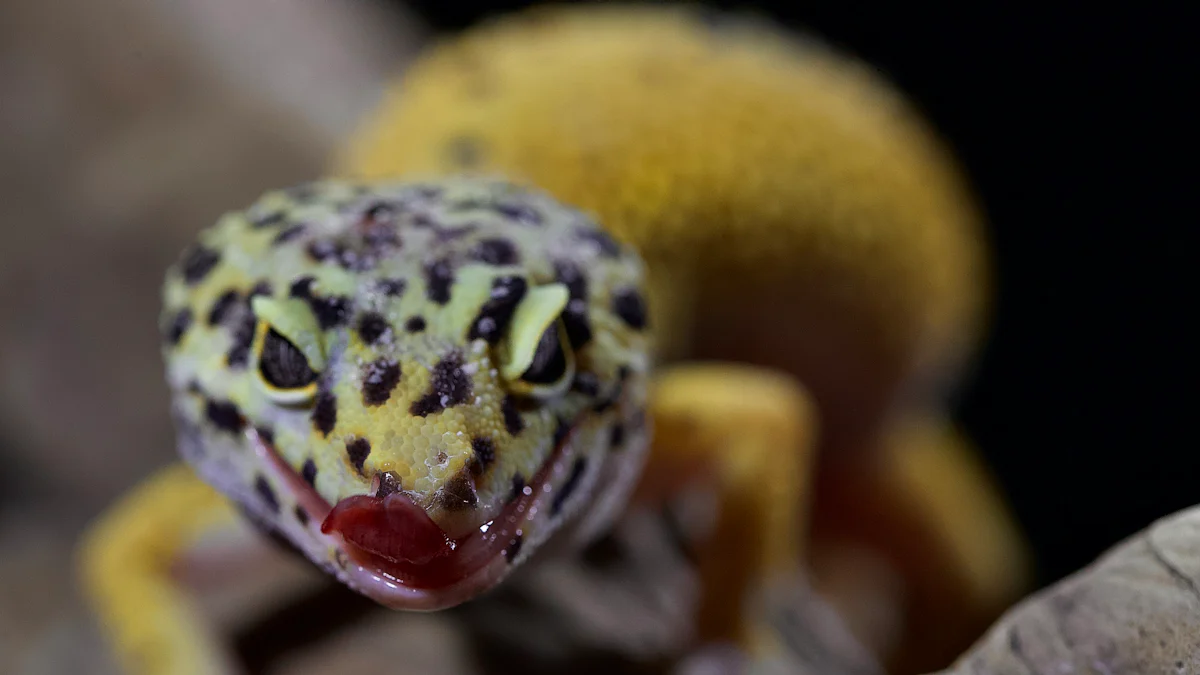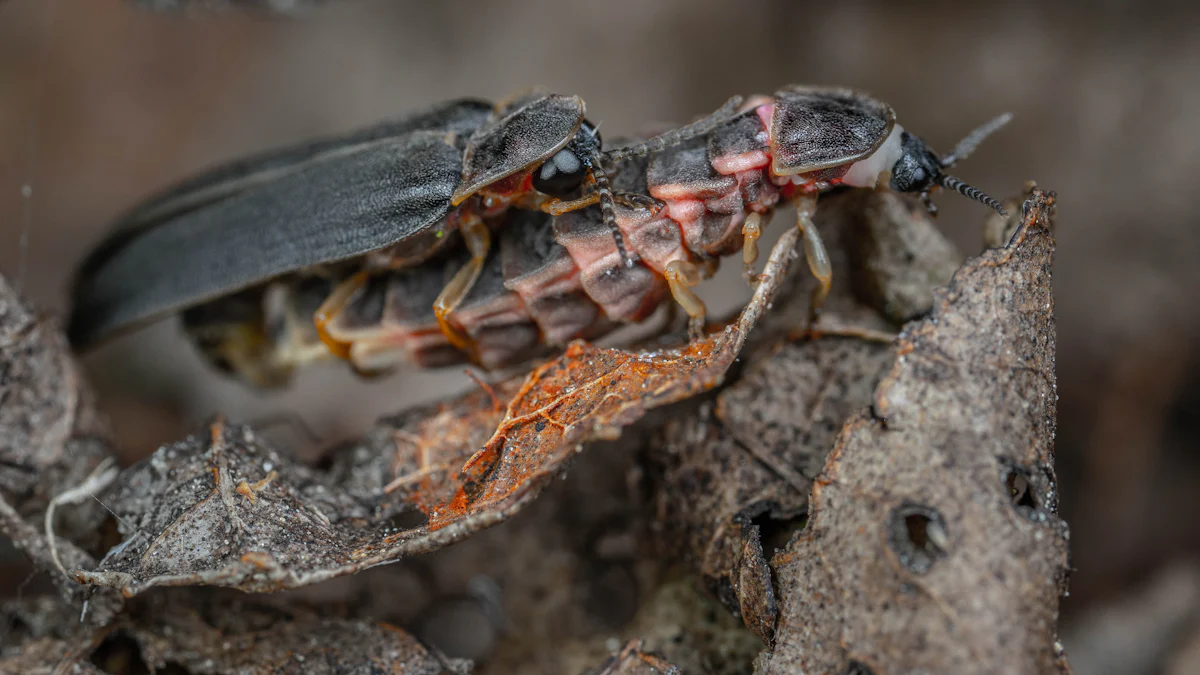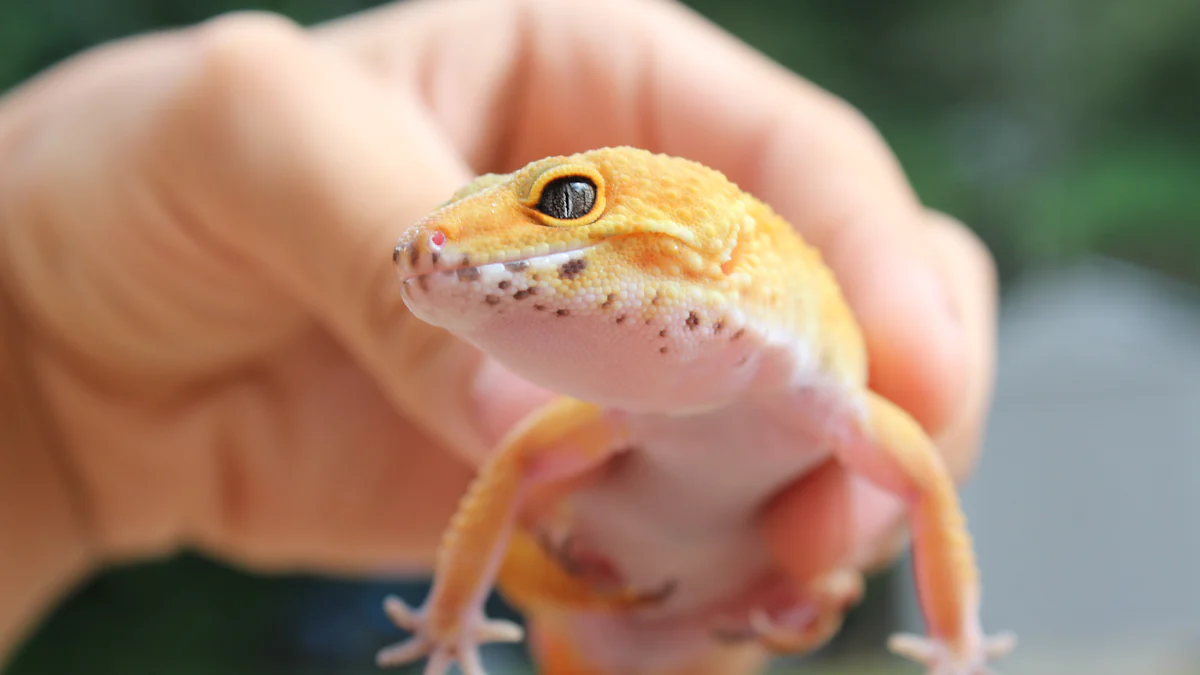
Leopard geckos can safely enjoy dried black soldier fly larvae as part of their diet. These larvae pack a punch when it comes to nutrition, offering a natural calcium-to-phosphorus ratio of 2.5:1. This high calcium content, embedded within their exoskeleton, supports strong bones and helps prevent metabolic bone disease. Beyond calcium, they provide essential amino acids like lysine and leucine, along with vitamins such as B1 and B2. Their digestibility has been proven in studies, making them a reliable option for your gecko’s health. Adding these larvae to your gecko’s meals can be both safe and beneficial.
Key Takeaways
- Dried black soldier fly larvae are a nutritious addition to your leopard gecko’s diet, providing a high calcium-to-phosphorus ratio of 2.5:1, which supports strong bones.
- These larvae are rich in essential amino acids and vitamins, making them a balanced source of protein and energy for your gecko.
- Feeding guidelines suggest offering 5-10 larvae for adults and 10-15 for juveniles, ensuring a varied diet to prevent nutritional imbalances.
- Soaking dried larvae in warm water before feeding can enhance their texture and make them easier for your gecko to consume.
- Compared to other feeder insects like mealworms and crickets, black soldier fly larvae offer superior calcium content and digestibility, reducing the need for additional supplements.
- Monitor your gecko’s response to the larvae and adjust portion sizes as needed to maintain their health and activity levels.
- Incorporating dried black soldier fly larvae into your gecko’s diet can lead to improved vitality and overall well-being.
Nutritional Benefits of Dried Black Soldier Fly Larvae

High Calcium Content
Calcium plays a vital role in your leopard gecko’s health. Dried black soldier fly larvae stand out as a calcium-rich feeder option. They naturally offer a calcium-to-phosphorus ratio of approximately 2.5:1, which supports strong bones and helps prevent metabolic bone disease. Unlike other feeder insects, these larvae don’t always require dusting with calcium powder, making them a convenient choice for you. However, studies suggest that while leopard geckos can digest these larvae well, their calcium digestibility may not be as high as expected. To ensure your gecko gets enough calcium, you might still want to include other calcium sources or supplements in their diet.
Protein and Fat Content
Protein fuels your gecko’s growth and energy, and dried black soldier fly larvae deliver plenty of it. These larvae are packed with high-quality protein, which contains essential amino acids like lysine and leucine. These amino acids contribute to muscle development and overall vitality. The fat content in the larvae is moderate, providing a balanced energy source without overloading your gecko with unnecessary fats. This balance makes them an excellent addition to your gecko’s diet, especially if you’re looking for a nutritious yet low-maintenance feeder option.
Other Nutritional Advantages
Dried black soldier fly larvae bring more to the table than just calcium and protein. They contain vitamins like B1 and B2, which support your gecko’s metabolism and energy levels. Their natural digestibility has been proven in studies, meaning your gecko can absorb the nutrients effectively. Additionally, these larvae are free from harmful pesticides and heavy metals, unlike some wild-caught insects. The drying process also eliminates parasites and bacteria, ensuring a safe feeding experience for your pet. While they lack fat-soluble vitamins like A and D3, you can easily address this by offering a varied diet that includes other nutrient-rich feeders.
Comparison with Other Feeder Insects
When choosing the best feeder insects for your leopard gecko, understanding how dried black soldier fly larvae compare to other options can help you make informed decisions. Let’s break it down.
Black Soldier Fly Larvae vs. Mealworms
Mealworms are a popular feeder insect, but they fall short in several areas when compared to dried black soldier fly larvae. One of the most significant differences is calcium content. Black soldier fly larvae contain about 50 times more calcium than mealworms. This makes them a superior choice for supporting your gecko’s bone health and preventing metabolic bone disease.
Mealworms also have a harder exoskeleton due to their high chitin content, which can make digestion more challenging for your gecko. In contrast, black soldier fly larvae are easier to digest, ensuring your pet absorbs more nutrients. While mealworms do provide protein and fat, they lack the balanced nutritional profile that black soldier fly larvae offer. If you’re looking for a feeder that delivers essential amino acids, vitamins, and minerals in one package, black soldier fly larvae are the better option.
Black Soldier Fly Larvae vs. Crickets
Crickets are another common feeder insect, but how do they stack up against black soldier fly larvae? For starters, black soldier fly larvae have a more balanced calcium-to-phosphorus ratio. This means they require less supplementation, saving you time and effort. Crickets, on the other hand, often need to be dusted with calcium powder to meet your gecko’s dietary needs.
In terms of digestibility, black soldier fly larvae come out ahead. Their fiber content, around 8%, makes them easier for reptiles with shorter digestive tracts to process. Crickets can sometimes carry parasites or pesticides, posing a risk to your gecko’s health. Dried black soldier fly larvae undergo a hygienic drying process that eliminates these concerns, offering a safer feeding option. However, keep in mind that black soldier fly larvae are higher in fat, so you’ll need to monitor your gecko’s weight if you include them regularly in their diet.
Black Soldier Fly Larvae vs. Dubia Roaches
Dubia roaches are often praised for their high protein content, but black soldier fly larvae hold their own in this comparison. While both options provide excellent protein levels, black soldier fly larvae have the added advantage of significantly higher calcium content. This makes them a more well-rounded choice for your gecko’s overall health.
Dubia roaches are low in fat, which can be beneficial for geckos prone to obesity. However, they lack the natural calcium-to-phosphorus balance found in black soldier fly larvae. If you’re looking for a feeder insect that reduces the need for additional supplements, black soldier fly larvae are the way to go. Additionally, the drying process for black soldier fly larvae ensures they are free from harmful contaminants, giving you peace of mind when feeding your pet.
Feeding Guidelines for Dried Black Soldier Fly Larvae

Portion Sizes and Frequency
Feeding your leopard gecko the right amount of dried black soldier fly larvae is essential for their health. These larvae are nutrient-dense, so you don’t need to overfeed them. For adult geckos, offering 5–10 larvae per feeding session works well. Juveniles, with their higher energy needs, can handle slightly more—around 10–15 larvae. Stick to feeding them every other day for adults and daily for juveniles. This schedule ensures they get the nutrition they need without risking overfeeding.
Balance is key. While dried black soldier fly larvae are packed with calcium and protein, they shouldn’t be the only food in your gecko’s diet. Rotate them with other feeder insects like crickets or dubia roaches to provide a variety of nutrients. A diverse diet keeps your gecko healthy and prevents them from becoming picky eaters.
Preparation Tips
Preparing dried black soldier fly larvae is simple and hassle-free. Unlike live feeders, these larvae don’t require gut-loading or dusting with calcium powder in most cases. However, soaking them in warm water for a few minutes before feeding can make them softer and easier for your gecko to eat. Hydration also helps mimic the texture of live prey, which some geckos prefer.
Always check the packaging for any specific instructions from the manufacturer. Some dried larvae may already be fortified with additional nutrients, while others might benefit from a light dusting of vitamin supplements. Avoid feeding larvae that appear moldy or have an unusual smell, as this could indicate spoilage.
Monitoring Your Gecko’s Response
Pay close attention to how your gecko reacts to dried black soldier fly larvae. Watch for signs of enthusiasm during feeding. If your gecko eagerly eats the larvae, it’s a good sign they enjoy them. On the other hand, if they seem disinterested, try offering the larvae in smaller portions or mixing them with other feeders.
Monitor their health over time. Look for improvements in their activity levels, skin condition, and overall growth. The high calcium content in these larvae can support healthy shedding and bone development. If you notice any issues, such as weight loss or lethargy, consult a reptile veterinarian. Adjusting portion sizes or supplementing their diet might be necessary.
Pro Tip: Keep a feeding journal. Record what you feed your gecko, how much they eat, and any changes in their behavior or appearance. This habit helps you track their dietary needs and ensures they’re thriving.
Dried black soldier fly larvae are a fantastic addition to your leopard gecko’s diet. Their naturally high calcium content supports strong bones and reduces the need for extra supplements. These larvae also provide essential nutrients like protein and vitamins, ensuring your gecko stays healthy and active. Their digestibility makes them a reliable choice, especially compared to other feeder insects. By feeding them in moderation and preparing them properly, you can enhance your gecko’s overall well-being. Incorporate these larvae into your gecko’s routine for a safe, nutritious, and convenient feeding option.
FAQ
Can leopard geckos eat dried black soldier fly larvae every day?
You can feed dried black soldier fly larvae to your leopard gecko regularly, but not every day. These larvae are nutrient-dense, especially in calcium and protein, but variety is essential for a balanced diet. Rotate them with other feeder insects like crickets or dubia roaches to ensure your gecko gets all the nutrients it needs. Overfeeding one type of food can lead to nutritional imbalances.
Do dried black soldier fly larvae lose nutrients compared to live ones?
Yes, dried larvae may lose some nutrients during the drying process, especially water-soluble vitamins. However, they still retain high levels of calcium, protein, and essential amino acids. To make up for any lost nutrients, you can supplement your gecko’s diet with other feeders or vitamin powders. Soaking the dried larvae in water before feeding can also help mimic the texture and hydration of live prey.
How do I prepare dried black soldier fly larvae for my gecko?
Preparing dried black soldier fly larvae is simple. You can serve them as-is, but soaking them in warm water for a few minutes softens them and makes them easier to eat. This step also hydrates the larvae, which some geckos prefer. Always check the packaging for specific instructions and avoid feeding larvae that look moldy or smell unusual.
Are dried black soldier fly larvae safe for leopard geckos?
Yes, dried black soldier fly larvae are safe for leopard geckos. They undergo a hygienic drying process that eliminates parasites, bacteria, and harmful contaminants. Unlike wild-caught insects, these larvae are free from pesticides and heavy metals. This ensures your gecko gets a clean and safe feeding experience.
How do black soldier fly larvae compare to mealworms?
Black soldier fly larvae are far superior to mealworms in calcium content, offering about 50 times more calcium. They also have a softer exoskeleton, making them easier to digest. While mealworms provide protein and fat, they lack the balanced nutritional profile of black soldier fly larvae. If you want a feeder that supports bone health and overall vitality, black soldier fly larvae are the better choice.
Can juvenile leopard geckos eat dried black soldier fly larvae?
Absolutely! Juvenile leopard geckos can benefit from the high protein and calcium content of dried black soldier fly larvae. Offer them slightly more than you would an adult gecko—around 10–15 larvae per feeding. This helps support their rapid growth and development. Just remember to include other feeders in their diet for variety.
How often should I feed dried black soldier fly larvae to my gecko?
For adult geckos, feeding dried black soldier fly larvae every other day works well. Juveniles, with their higher energy needs, can eat them daily. Offer 5–10 larvae per session for adults and 10–15 for juveniles. Adjust the portion size based on your gecko’s appetite and activity level.
Why are black soldier fly larvae considered a sustainable feeder option?
Black soldier fly larvae are eco-friendly because they can feed on a wide range of organic waste, like food scraps and compost. This reduces waste while producing a high-protein, nutrient-rich food source. Their ability to thrive on sustainable diets makes them an environmentally responsible choice for reptile owners.
What should I do if my gecko refuses to eat dried black soldier fly larvae?
If your gecko seems uninterested, try soaking the larvae in warm water to soften them. You can also mix them with other feeders to encourage your gecko to try them. Monitor your gecko’s response and adjust the portion size or presentation as needed. Patience is key, as some geckos take time to adapt to new foods.
Can dried black soldier fly larvae improve my gecko’s health?
Yes, these larvae can enhance your gecko’s health when included in a balanced diet. Their high calcium content supports strong bones and healthy shedding. The protein and amino acids contribute to muscle development and energy. Many gecko owners report improved activity levels and overall vitality after incorporating these larvae into their pet’s diet.


